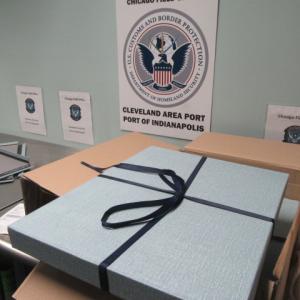Indianapolis US CBP Seize Shipments Laced with 28 lbs. of Ketamine
On September 10 officers at the port of Indianapolis inspected two shipments from the same shipper containing shirts inside gift boxes. Further inspection revealed that concealed between the press cardboard of the gift boxes was 28 pounds of Ketamine Hydrochloride, a schedule 3 controlled substance.

During routine inspections of arriving parcels, officers decided to take a closer look at two suspicious shipments arriving from the same shipper in Madrid, Spain. Inside of both shipments were gift boxes containing shirts. Further exam of the boxes revealed that the boxes had a white powdery substance hidden within the box flaps that tested positive for ketamine hydrochloride. In total nine gift boxes contained 28 pounds of ketamine. Both shipments were headed to separate addresses in California. The cumulative value of the ketamine was about $200,000.
“CBP encounters narcotics and other contraband concealed in an ever-changing variety of items,” said LaFonda D. Sutton-Burke, Director, Field Operations-Chicago Field Office. “Our officers remain vigilant often using their experience and intuition to discover these concealment methods to keep dangerous drugs out of our communities.”
Ketamine is a Schedule III drug used in both human and veterinary medicine to induce sedation, immobility, and relief from pain. It has recently been used by medical professionals for mental health and substance use disorders. Ketamine is abused for its ability to induce dissociative sensations and hallucinations and has also been used to facilitate sexual assault. Typically, ketamine abuse occurs among teens and young adults at nightclubs and private parties. Overdoses can lead to nausea, irregular heart rate, muscle stiffening, unconsciousness, and respiratory failure leading to death.
“Our highly experienced officers continue their mission to protect American citizens,” said Jeremy Brodsky, Indianapolis Port Director. “We are committed to stopping the flow of illegal and dangerous drugs that are used to prey on innocent civilians.”




